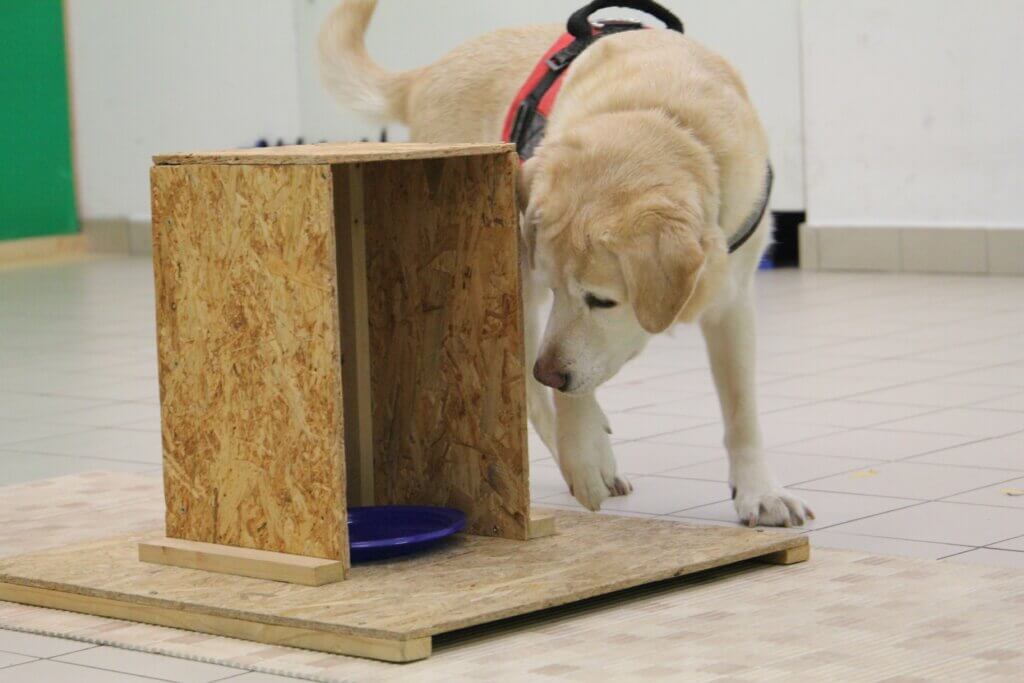Not only are dogs man’s best friend, they also offer insight into how people decline cognitively. A new study published in GeroScience is revealing fascinating parallels between the aging canine mind and human cognitive aging.
A team of researchers from Eötvös Loránd University in Budapest set out to comprehensively analyze age-related changes in dog cognition. They administered a battery of cognitive tests to 129 pet dogs ranging in age from nearly 3 to almost 15 years old. The tests assessed abilities like problem solving, learning, memory, and attention.
Scientists uncovered a hierarchical structure in canine cognition, with performance across different tests clustering into two main domains: individual problem solving and learning. Individual problem solving involved tasks where dogs had to independently figure out how to obtain hidden food rewards. The learning domain comprised tests where dogs needed to make associations, such as between making eye contact with a person and receiving a treat.
These two cognitive domains were themselves linked, suggesting an overarching general intelligence factor in dogs akin to the “g” factor in humans. This canine “g” was validated by its correlation with performance on separate tests of discrimination and reversal learning (which tap abilities like behavioral flexibility) as well as with personality traits like neophilia (love of novelty) and exploration. Dogs with higher canine “g” were quicker learners and more flexible thinkers.
“The cognitive and socio-cognitive performance of dogs is a highly popular topic in scientific literature, yet most studies are comparative, focusing on how well dogs perform as a species,” says lead study author Borbála Turcsán, from Eötvös Loránd University, in a media release. “Surprisingly, these studies have largely overlooked the individual differences in specific skills and the reasons behind them. As a result, we know very little about how dogs’ cognitive abilities are structured.”
So what happens to doggy brainpower with age? Researchers found three distinct age-related processes. Mirroring findings in humans, one was a global effect acting on the general intelligence factor — older dogs tended to have lower canine “g” scores overall. Two other effects selectively impacted memory and learning.
Not all senior dogs showed the same degree of cognitive decline. The study identified health status as a key factor. The negative relationship between age and canine “g” was much stronger in dogs with more health issues, while dogs in good health showed little to no association between age and general cognitive performance. This parallels findings in humans, where conditions that impact overall health, like cardiovascular disease, can accelerate cognitive aging.
Looking at changes within individual dogs over time, the researchers found the rate of cognitive aging depended on baseline g scores and age. Younger dogs with lower starting g scores tended to show more improvement over the years, likely reflecting their greater capacity for cognitive growth. In contrast, older dogs and those with higher baseline scores had less room for gains, exhibiting more decline on average.
Another factor that emerged as important was the dogs’ communication scores — a measure of their attentiveness and responsiveness to human gestures and commands. More communicative dogs experienced steeper cognitive decline over time. Researchers suggest this may reflect a greater tendency of these socially attuned dogs to rely on human cues rather than independently problem-solving, which could impact their cognitive performance as they age.

“This new research highlights intriguing parallels between human and canine aging, further strengthening the argument that dogs serve as an excellent model species for aging research,” explains study author Enikő Kubinyi, leader of the MTA-ELTE Companion Animal Research Group and the Senior Family Dog Program. “Moreover, our findings support the existence of the ‘canine g factor’, suggesting that dogs can also help in understanding the evolution and background of human intelligence.”
As one of the most popular pet species and one that shares our home environments, dogs offer a unique window into how lifestyle factors may shape cognitive aging. They are also more practical for longitudinal studies spanning their shorter lifespans. At the same time, interventions to support healthy cognitive aging in pet dogs could have immediate benefits for their quality of life and longevity.
Just as the old adage goes, you can’t teach an old dog new tricks — but perhaps in time, science will uncover ways to help keep senior minds spry, whether covered in fur or bare-skinned.












